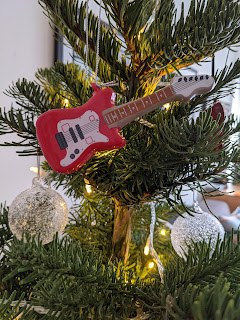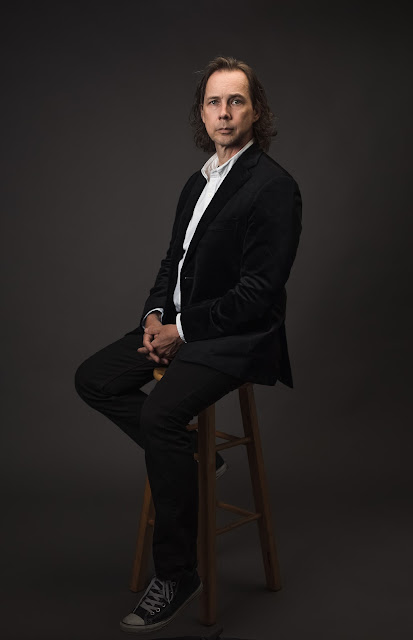2022 was another year in the strange, warped time of the pandemic. Perhaps less bent or blurry than the previous two years, but passed quickly (I can’t believe it’s over already!) and yet at times seemed to drag on forever.
I did not write much on this blog, but I did also start a Substack where I have duplicated a few pieces and hope to add more in the future. I did manage a decent amount of journaling, a few essays, and a pile of songs.
Throughout the year, therapies mental and physical made my weeks easier and are continuing to help me deal with old injuries. I kept up my fitness and general health. I also appreciated the many great conversations I had with friends, mostly over Zoom, and occasionally, rarely, in person. I also continued to co-host the Music, Mindfulness, and Madness podcast, which provided forum and focus for many of the things I have been thinking about.
My singing has continued to improve, with help from May Oskan. I can't sing like I used to, but in some ways, I can sing better now.
This year, like the last few, has been tough for many people. I had my own losses and problems, but I try not to dwell on them, particularly when I think about the state of the world. The environment is still in trouble. Ukraine is still under attack from Russia. American politics continues its toxic swirl, even if there are signs Trump might actually be somewhere between irrelevant and in trouble. The economy is wobbling as well, and that doesn't bode well for any of us, either.
On the plus side, I managed to not get COVID this year (knock wood), though it seems I did manage to pick up a cold in the last few days. I was creative, made some progress on projects and issues, and had a few moments of genuine bliss and relaxation amidst everything else.
January ended with the passing of Jon Appleton, one of my musical mentors, and the pandemic continuing to grind on, with Omicron cresting. Lauren Tabak took some nice, spooky photos of me.
February saw the release of Rêvenir’s Cure For Loneliness, my goth-rock collaboration with Christy Novack. This is one of the finest things I have released to date.
I also bought some new clothes, which may seem like a strange thing to do at a time when many of us aren't even wearing real pants on a daily basis. Dressing for me during the pandemic has often involved picking up whatever I was wearing yesterday off the floor and putting it on again. But I wanted to have some decent threads for whenever I was heading back out into the world.
But February's highlight was a trip to visit my dear friend Liz in Colorado. This was my first time on a plane since the pandemic started. It definitely caused some anxiety, but the trip was great, despite bitter cold. Nothing beats seeing old friends in person.
March saw me going on my first business trip since leaving PlayStation: Chicago, for the American Academy of Orthopedic Surgeons conference. This was also the first time I got to meet my co-workers in person, and was one of the reasons I bought some new business clothes. I loved every minute of it, except for the part where my feet had forgotten how to wear anything other than my house sneakers, and were blistered and sore by the end of the first of the 5 days of the trip!
I also spent some of my evenings in 2022 staying up late watching old TV shows on streaming services, some comforting nostalgia in dark times. Night Court. Daria. News Radio. Even a few bits of Knight Rider and Hart to Hart. Relics from a distant age, reminding me of how things used to be, for better or worse.
April, I flew to Utah for a company offsite. It was a thrilling experience, made perhaps more dizzying by both the headache-inducing altitude (7000 feet above sea level!) and the fear of COVID. I managed not to get it this trip! On the minus side, I also had some painful dental work done. Boo. Still better than not doing it, I suppose.
May kicked off with another COVID booster shot, which helped Iran and I prepare for a trip to Vancouver to celebrate our anniversary. We saw some friends, ate some tasty food, hiked through a beautiful Canadian park, and managed to find a last-minute testing site so we could be allowed to return to our home country.
If that wasn't enough excitement, we also saw Bauhaus live in San Francisco, where they put on a killer show. I feel fortunate to have seen them yet again.
June brought outdoor meals with friends, in San Francisco restaurants, enjoying the temperate weather, and some repairs to the car. This time, the person who hit it left a note, and paid the full costs of repairs, somewhat restoring my faith in humanity.
I turned 53 in July of this year. I celebrated by getting out of town, up to a favorite spot on the Northern California coast. I closed the month out with a trip back east to visit some old friends and see some family. I was happy to see everyone, and drove past some old haunts. The sweltering and muggy weather reminded me why I moved to California in the first place.
July also saw the sudden passing of Dean Williams, a friend of mine. His tragic death haunted me throughout the rest of 2022, causing me to tear up whenever I saw a photo of him, or heard some of his music. I am still learning how to grieve, and spent a lot of time thinking about him and the many other friends I have lost in years distant and recent.
I have not played live with Sid Luscious and The Pants since the pandemic started, but I have been doing the occasional Zoom performance. In August, one of my friends (and songwriting students) threw a party, and we threw a mini-set together to perform for people. It reminded me how thrilling and terrifying it is to play in front of real people, particularly when you are under-rehearsed!
I also bought a resonator guitar, adding some swampy strum to my arsenal.
September was notable for the passing of Iran's uncle David Sawyer. He had lived a long and full life, with his work making him a titan in the woodworking world. He was deeply and dearly loved by his family and friends.
October had a few highlights as well. I did a guest presentation for Mark Delong's technology seminar at Duke University, and wrote a nice essay about "Technological Rubble" to tee it up. We flew to Vermont for a memorial for Uncle Dave, and I also managed to see two old friends, one expected, one a pleasant surprise.
November had Thanksgiving, and more work on a new music project I will be revealing soon.
And here I am, at the end of December. Aside from the usual end of year appliance failures (this year: garbage disposal!) and medical appointments (everything's...fine?), I have been enjoying some time off from work, reflecting on the year, listening to music, and writing things like this essay.
I also joined a gym, and returned to lifting weights for the first time in almost 3 years. I'm in a very different environment than the old dingy place I used to lift in. It's a lot smaller, but for now, that's just fine. It feels good to use those muscles again, and I treasure the soreness.
Today has been a microcosm of the year. A rush of anxiety (Is this COVID or a cold? Time is running out!), problems (leaks in windows and other places), peace (as I sit in a comfortable chair, listening to quiet music, writing thank-you notes and essays), tasty food (coffee in the morning, bespoke pizza soon for dinner!), the company of my beloved, and some fun and music. I only wish there were more time to enjoy it all.
But in 4 hours the day, the month, the year will be over. I have some intentions and plans for 2023, but those can wait for now.
Thank you for being here with me.





